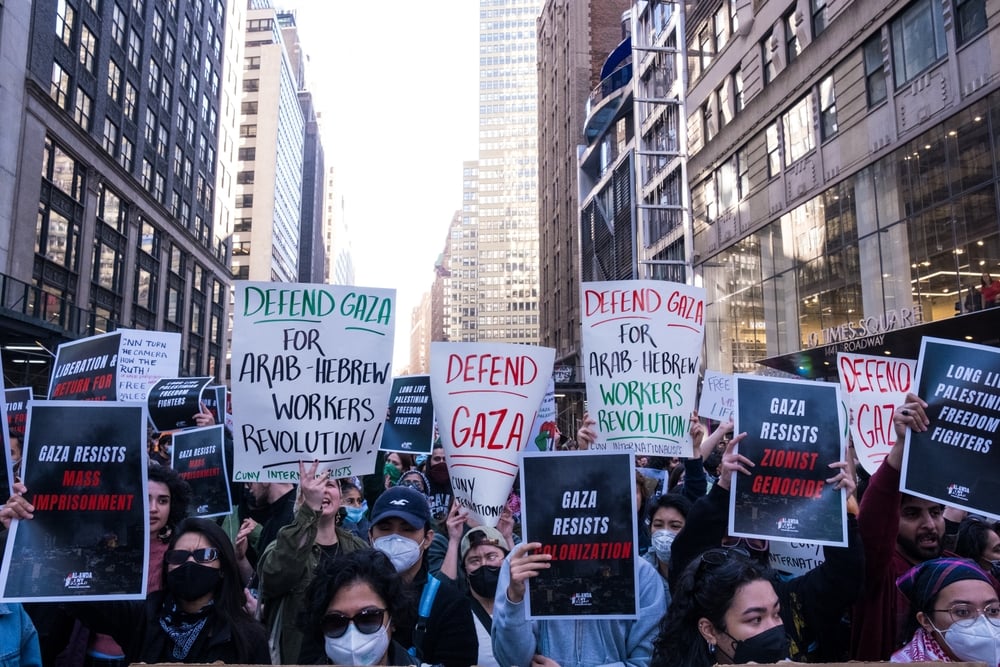How many other small businesses have suffered both physical damage to their shops and stalls and loss of customers, because screaming protesters surrounded their shops and vandalized them?
By Hugh Fitzgerald, Frontpage Magazine
Those pro-Hamas anti-Israel protesters who have been marching along the streets of European cities screaming their antisemitic hate, calling for the destruction of Israel and its replacement by a 23rd Arab state — for that is the real meaning of “From the river to the sea/Palestine shall be free”— have damaged shops, including stand-alone stalls, and by their threatening presence have discouraged customers from entering the businesses those protesters stand in front of, spewing their hate.
More on what anti-Israel protesters did to one business in London’s Kentish Town, a florist’s modest outside stall, can be found here: “Anti-Israel vandals force Kentish Town flower stall to close,” by Jane Prinsley, The JC, June 7, 2024:
Anti-Israel protesters in north London have wreaked havoc on a flower stall, damaging equipment and forcing the shop to close.
Florist Natasha Boon faces costly repairs and lost income after her shop was forced to shut down amidst the chaos.
Demonstrators from “Gaza Week Camden” allegedly destroyed flower boxes, damaged the stall’s equipment, stole its electrical supply, and on Thursday forced the shop to shut entirely.
Boon, 32, said she has lost at least £500 in income and will have to spend a significant sum repairing the damage done to her stall’s awning….
The problems began on Wednesday when a planned demonstration surrounded Boon’s stall. The florist asked protesters to move away but was told by the group that the council had approved the protest and they refused to move.
“Then it escalated within minutes and there were hundreds if not thousands of people all surrounding my stall, shouting,” Boon said.
She lost multiple customers throughout Wednesday and had to decline phone orders….
Street traffic for the florist’s stall plummeted to nothing; no one wanted to brave the raucous crowd surrounding her business.
And Boon discovered that she could not take most phone orders because she was unable to hear customers over the din of the protesters.
And for those she had been able to hear she knew that neither she, nor a delivery man, could wade their way through the mass of protesters to deliver those phone orders.
So she simply had to decline all orders by phone.
The protesters harassed would-be customers, forcing into their hands leaflets about the “‘apartheid colonial-settler genocidal state” of Israel, not leaving them alone for one minute to look at the flowers for sale.
These customers left Boon’s flower stall without buying anything, in order to avoid the incessant harassment by these protesting bullies.
The protesters vandalized her stall, breaking its canopy, which will cost hundreds of pounds to repair, stood on flower boxes and covered every surface of Boon’s stall with Palestinian flags and their own merchandise for sale, including signs reading “From the river to the sea, Palestine shall be free” and “Say No to Genocide in Gaza,” placed front and center on what was supposed to be a florists’ stall.
For Natasha Boon, a modest keeper of a flower stall, the added expense of repair to the shop’s canopy of 500 pounds will be a major blow.
While the stall is in such disrepair, she cannot conduct business as usual. She needs the damaged canopy to be quickly repaired. Coming up with 500 pounds will for Ms. Boon be a terrific effort.
And how many hundreds or thousands of pounds in lost business has she suffered because of those protesters surrounding her stall, driving away would-be customers?
How many other small businesses, that allow their owners to just barely eke out a most modest livelihood, the way Natasha Boon does with her flower stall in Kentish Town, have suffered both physical damage to their shops and stalls, and loss of customers, because screaming protesters surrounded their shops, vandalizing them, and kept potential customers well away?
The media are uninterested in the story of the economic damage inflicted on innocent men and women when their businesses happen to be situated where a demonstration is taking place.
When thousands of demonstrators converge on a street or a square, driving away customers, and damaging shop fronts or, in the case of Natasha Boon, breaking the canopy of her stall, they ought to be called out for the economic damage that they have wrought on these innocent businessmen and women.
These protesters — many of them well-to-do salon Bolsheviks — don’t give a damn about what their presence means for the businesses to which they block access, nor do they care about the physical damage to those businesses.
This collateral damage to innocent shopkeepers just barely making ends meet, by the acts of those often well-heeled protesters, ought to be given more attention, and the protesters themselves become the object of collective ire, for the harm they have done to such people as Natasha Boon, who cannot afford to lose business because of these protesters, so clearly indifferent to her wellbeing.


